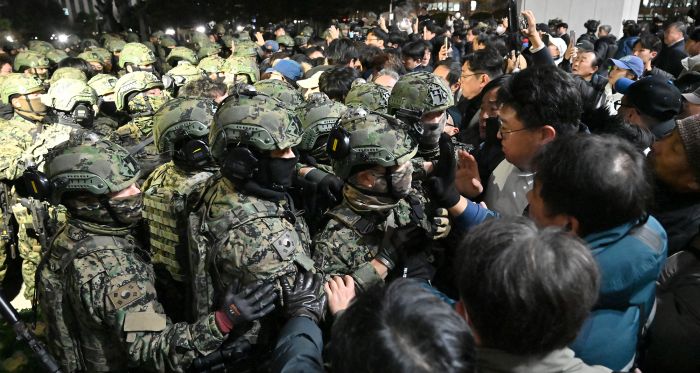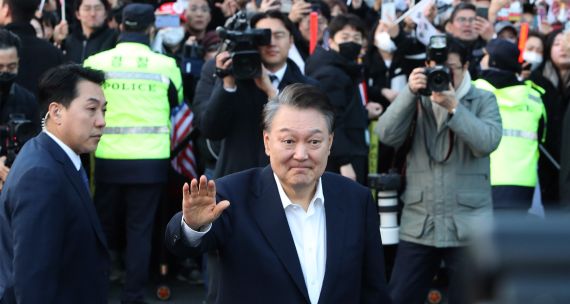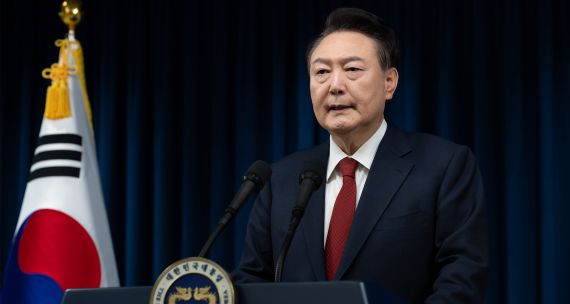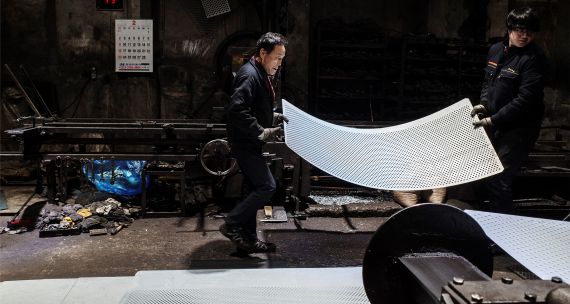On December 3–4, 2024, East Asia experienced the near-collapse of one of its most celebrated democracies. With a late-night announcement, South Korean President Yoon Suk Yeol mustered military forces to resolve a mere budget stalemate and a strike by medical professionals. He declared a sweeping form of martial law, including the shutdown of political parties, the parliament, and free media. Landing from helicopters, elite military forces surrounded the parliament building and were dispatched to arrest key leaders, including the leader of Yoon’s own party.
The chaos ended six hours later with a vote by the opposition-controlled National Assembly to lift martial law. The legislators had managed to force their way through the military cordons with help from the crowd of citizens who had mobilized outside the building.
The National Assembly re-convened on December 7 to consider impeachment of Yoon for treason and abuse of the country’s constitution. Members also discussed a special investigation into alleged corruption by Yoon’s wife, which he had already blocked three times. That vote required 200 out of the 300 members of parliament (MPs) voting in favour. The vote failed, with all but three members of Yoon’s People Power Party (PPP) voting against the special investigation and boycotting the impeachment vote.
For now, the PPP appears to be trying to find a middle position between impeachment and the continuation of Yoon’s presidency. Meanwhile, party leaders seem to be trying to buy time to let the current court cases against the opposition leader, Lee Jae-Myung of the Democratic Party (DP) of Korea, run their course. PPP leader Han Dong-Hoon and Prime Minister Han Duck-Soo have promised to secure Yoon’s early resignation and to take on the role of acting authority. Their statement immediately faced fierce criticism, with MPs from their own party arguing that such a process would be unconstitutional.
A new impeachment vote is scheduled for December 14, but a breakthrough seems unlikely. The coming weeks will remain tense, with large-scale public mobilization and protests and complex party manoeuvres. Although the DP is ultimately likely to come to power, the road by which they get there will be bumpy.
What Happened During the Critical Six Hours
In his abrupt declaration of martial law, Yoon cited the need to “crush anti-state forces that have been wreaking havoc.” The police promptly sealed off the National Assembly, barring legislators and advisers from entering. Army Chief of Staff General Park An-su, whom Yoon appointed as the martial law commander, announced that Martial Law Decree No. 1 had taken effect as of 11 p.m. The martial law command dispatched about 230 soldiers to the National Assembly, and about 290 were dispatched to the National Election Commission, breaking windows to gain entry.
Around 1 a.m. on December 4, National Assembly Speaker Woo Won-Shik convened 190 legislators, who unanimously voted to invalidate Yoon’s martial law declaration. DP leader Lee Jae-Myung, whose party holds 170 out of 300 assembly seats, with the ability to muster 19 more from five allied parties, announced his party’s members would remain in the building until Yoon formally lifted his order.
At 4:30 a.m. on December 4, Yoon announced he would comply with the assembly’s decision, officially ending the six-hour martial law declaration.
Why It Happened: Motivations and Triggers
Why did Yoon declare martial law? His initial decree provided six reasons, including “preventing attempts to overthrow the free democratic system” and “requiring all medical professionals on strike to return to work within 48 hours.” In his address to the nation, Yoon accused the opposition of attempting to paralyze executive power through impeachment motions and passing a reduced annual budget, which he claimed would collapse the constitutional order.
Critics, including politicians, experts, and even conservative media, have pointed out that none of these reasons meet the constitutional requirements for declaring martial law. According to Article 77, martial law can be declared only “during wartime, a state of emergency, or a national crisis equivalent to such situations.”
At a more fundamental level, there are at least three factors that likely contributed to Yoon’s drastic decision. First, he assumed office in May 2022 as a hardline conservative but won by a razor-thin margin of 0.73 percentage points. His administration has faced a political stalemate, especially since April 2024, when opposition parties won a landslide majority in the legislature. Yoon has clashed with the opposition over many of his policies, the budget, and special investigations into his wife, Kim Keon-Hee, who has faced allegations of corruption, academic plagiarism, and stock manipulation.
Second, tensions have escalated between Yoon and the opposition over attempts by the latter to impeach top government figures, some of whom Yoon appointed. Moreover, while the opposition has attempted to designate a special prosecutor to investigate the first lady, Yoon’s office has repeatedly vetoed these efforts.
Third, Yoon’s approval rating has fallen dramatically. A Korea Gallup poll had his approval rating at 17 per cent as of early November, with his disapproval rating reaching 74 per cent, largely due to scandals involving the first lady.
On December 6, opposition legislators insinuated that Yoon firmly believed that fraud had been committed in the recent National Assembly election and pointed out that about 280 martial law soldiers were dispatched to the National Election Commission, according to Defense Minister Kim, “to investigate election fraud.” During a hearing on December 10, Kwan Joong-Keun, commander of the Army Special Warfare Command, revealed that Yoon called him directly on the night of December 3 and ordered the troops to “quickly smash the assembly’s door and drag out the legislators who are inside.”
Who Were the Main Actors?
In recent days, it has come to light that only a few people knew in advance about Yoon’s plans. At 10 p.m. that evening, just before his martial law declaration, Yoon convened an emergency cabinet meeting with 11 key officials, including Prime Minister Han Duck-Soo and Defense Minister Kim Yong-Hyun. Reportedly, that was the first they were learning about it and expressed their strong opposition. Nevertheless, in South Korea the president holds unilateral authority to declare martial law under the constitution, and he was not dissuaded.
Investigations thus far have revealed that the “Chungam Faction” was key in this turmoil. Chungam is the name of the high school attended by both Yoon and Defense Minister Kim, who submitted the martial law proposal to Yoon. Counterintelligence Commander Yeo In-hyung, also from the Chungam Faction, told investigators that he was merely following orders and was not initially aware that he was helping to impose martial law. Although some experts have attributed Yoon’s rash decision to his impulsiveness and temper, he had apparently floated the idea in the fall, as he grew more frustrated by the political stalemate.
Larger Takeaways
Unlike Canada and Japan, which are parliamentary systems, and unlike the U.S., which is a pure presidential system, South Korea is a semi-presidential system. In such a system, voters directly elect both the president and their members of parliament. Both types of elected officials not only have direct democratic legitimacy, but the latter can also exert influence over executive power. For example, the president cannot override a budgetary stalemate in the parliament.
Unlike France, another semi-presidential system, South Korea’s system does not resolve the ‘imperial presidency’ problem, as the president is in charge of both domestic politics and foreign affairs, with the prime minister playing a more auxiliary role. Additionally, South Korea’s constitution endows the parliament with strong investigative powers. For such a system to function well, it requires consistency in voter behaviour or the ability or willingness on behalf of the two branches to compromise. Otherwise, when voters give different parties to control over the two branches of government, as is the current case in South Korea, the result can be intense polarization.
But South Korea is not entirely unique: two other semi-presidential systems also currently find themselves deep in crisis. The first is France, which has a strong form of semi-presidential system that includes no-confidence votes by parliament on the cabinet. In fact, on the day South Korea’s crisis erupted, the French parliament did just that, leaving the country without a government or budget and facing paralyzed governance and a potential financial crisis.
The other case is Taiwan. In January 2024, voters elected a president from the centre-left Democratic Progressive Party (DPP) while handing a parliamentary majority to the more conservative Kuomintang (KMT), along with the Taiwan People’s Party (TPP). Here, too, the two branches have engaged in open hostilities and have been unwilling to compromise and thus unable to govern. Each side accuses the other of being undemocratic or beholden to outside interests, echoing Yoon’s martial law speech. Despite accusations of parliamentary overreach, Taiwan’s Legislative Yuan has passed sweeping laws to try to exert control over the executive branch. Meanwhile, the president’s office has accused the KMT of betrayal and collusion with outside forces. The leader of the TPP (which holds the balance of power in parliament) has been arrested following a sweeping anti-corruption investigation of relatively old cases.
On the evening of December 3, the DPP parliamentary caucus appeared to have issued a chilling communique that cheered the attempted coup in South Korea and proposed learning from it. (The party later removed the post and walked back the statement.) This post spurred a widespread and critical debate in Taiwan, with critics pointing out that the DPP itself had been a victim of martial law during Taiwan’s authoritarian past. This episode reveals the extreme sense of polarization in Taiwanese politics and the extreme stalemate between the executive and legislative branches of government, similar to what we see in South Korea.
Three further takeaways emerge from the dramatic events in Seoul. First, in recent political cycles, taking revenge against one’s opponents has become a defining feature of South Korean politics. That, combined with post-COVID-19 anger and rising inequality, has made polarization especially toxic. Each side inhabits separate social media bubbles and considers the other an existential threat, which in people’s minds justifies taking drastic action, even at the cost of undermining democratic institutions. It is a political climate in which generation is pit against generation, men against women, and region against region. Compromise, mutual respect, and a sense of forbearance, all crucial norms for democracy to function, are almost invisible in today’s South Korean politics.
Second, there is a silver lining in South Korea’s political drama: within minutes of martial law being declared, tens of thousands of people poured out in the streets and surrounded parliament. They overwhelmed the army and enabled parliamentarians from both the ruling and opposition parties to break through military cordons and enter the National Assembly. It was a reminder, however, that democracy’s survival cannot be taken for granted and requires that the public fight for it in times of crisis. Within two hours of martial law being declared, all 190 MPs who made it to the National Assembly in the early hours of December 4 voted to repeal martial law. Crucially, the vote included 18 members of Yoon’s own party, who were supported by the ruling party leader, Han Dong-Hoon.
Third, South Korean democracy is nonetheless left weakened. Most South Koreans and observers agree that Yoon cannot remain in office, especially after he viewed the deployment of military forces normally trained for hunting North Korean leaders during wartime as an acceptable means to break a budget deadlock.
What’s Next?
While the U.S. played a key role in supporting democratic survival in South Korea by sending strong signals to Yoon that it did not support his actions, Yoon’s gambit has put the U.S.-South Korea alliance under strain. The South Korean and U.S. military personnel stationed in South Korea are under a unified command, and Yoon gave Washington no prior warning. What’s worse is that Yoon may have weakened U.S. support for South Korean security at the very moment when alliance-skeptic Donald Trump is about to return to the White House.
In addition, the ruling party is split. It formed a consensus not to support the impeachment motion against Yoon, but party leader Han, who initially stated that “the martial law is against the constitution,” now seems to be wavering. He has urged Yoon to step down from the party, but after Yoon’s plan to arrest Han came to light, Han has publicly urged that Yoon’s authority be suspended, even though most of the party’s MPs fiercely oppose that idea.
The opposition DP is determined to persist with impeachment. If they succeed, the case will be sent to the Constitutional Court. There, judges must make a final decision within 180 days. The complexity, however, is three of the required nine seats on that court are currently vacant, requiring a rapid nomination of new judges. If the court ratifies impeachment, a presidential election must be held within two months.
Public protests demanding Yoon’s impeachment are quickly expanding, putting more pressure on the ruling party. Chances are the two factions between Han and Yoon will end up dividing the party. Some conservative figures have tried to downplay the severity of this issue as an “overnight happening,” but the ramifications for South Korea’s democratic stability and political landscape could be long-lasting. And whether impeachment happens or is denied, Korea is likely to remain polarized and angry.
On December 12, in a televised speech, Yoon reiterated the arguments he made on his apology over the weekend, saying his martial law declaration stemmed from his efforts to stop “anti-state forces” and “prevent the collapse of Korea’s democracy.” He denied the insurrection charges against him and his allies, saying he would “fight to the end” even if he is has “impeached or investigated.” The next impeachment motion is scheduled for December 14. With Korea's democratic reputation affected and Korean diplomacy in limbo at a critical time of intense geopolitics, it is unlikely that Yoon will be able to hold on much longer. Whether he is pushed to resign by his party or impeached in the coming weeks, a new election is likely in the coming months.
• Edited by Erin Williams, Senior Program Manager, Vina Nadjibulla, Vice-President Research & Strategy, and Ted Fraser, Senior Editor, APF Canada.






